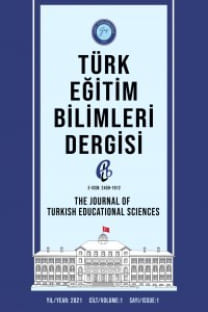Çoklu zeka kuramına dayalı etkinliklerin kavramsal öğrenmeye etkisi: Tam sayılarda dört işlem örneği
The effects of activities based on the multiple intelligence theory on students' conceptual learning: A case of basic operations in the integer numbers
___
- Azar, A., Presley, A.İ., Baklaya, Ö. (2006). Çoklu zekâ kuramına dayalı öğretimin öğrencilerin başarı, tutum, hatırlama ve bilişsel süreç becerilerine etkisi.Hacettepe Üniversitesi Eğitim Fakültesi Dergisi, 30, 45-54.
- Bak, Z. (2004). Çoklu zekâ kuramına dayalı rehber materyallerin kimya başarısına etkisi. Yayınlanmamış yüksek lisans tezi, Karadeniz Teknik Üniversitesi, Fen Bilimleri Enstitüsü, Trabzon.
- Baki, A. (2006). Kuramdan uygulamaya matematik eğitimi. Trabzon: Derya Kitabevi.
- Blythe, T., Gardner, H. (1990). A School for all ıntelligence. Educational Leadership, 47, 7, 33-37.
- Bümen, N. (2001). Gözden geçirme stratejisi ile desteklenmiş çoklu zekâ kuramı uygulamalarının erişi, tutum ve kalıcılığa etkisi. Yayınlanmamış doktora tezi, Hacettepe Üniversitesi, Sosyal Bilimler Enstitüsü, Ankara.
- Campbell, B. (1992). Multiple intelligences in action. Childhood Education, 68(4),197-200.
- Campbell, L., Campbell, B. (1999). Multiple intelligences and student achievement:success stories from six schools. ASCD,Virginia USA.
- Demirel, Ö., Tuncel, İ., Demirhan, C., Demir, K. (2008). Çoklu zekâ kuramı ile disiplinlerarası yaklaşımı temel alan uygulamalara ilişkin öğretmen-öğrenci görüşleri. Eğitim ve Bilim, 33, 147, 14-25.
- Durmuş, S., Karakırık, E. (2006). Virtual manipulatives in mathematics education: a theoretical framework [Electronic version]. The Turkish Online Journal of Educational Technology, 5(1), 117-123.
- Emig, V.B. (1997). A Multiple ıntelligences ınventory. Educational Leadership, 55(1), 47-50.
- Gardner, H.(1999). Intelligence reframed. Basic books,İnc.New York.
- Goodnough, K.C. (2000). Exploring multiple ıntelligences theory in the context of science education: an action research approach, Dissertation Abstracts International, 61(5), 2164A.
- Greenhawk, J. (1997). Multiple ıntelligences meet standards. Educational Leadership, 55(1), 62-64.
- Gürbüz, R. (2008). Matematik öğretiminde çoklu zekâ kuramına göre tasarlanan öğrenme ortamlarından yansımalar. Yayımlanmamış doktora tezi, Karadeniz Teknik Üniversitesi, Fen Bilimleri Enstitüsü, Trabzon.
- Gürçay, D., Eryılmaz, A. (2005). Çoklu zekâ alanlarına dayalı öğretimin öğrencilerin fizik başarısına etkisi. Hacettepe Üniversitesi Eğitim Fakültesi Dergisi, 29, 103-109.
- Korkmaz, H. (2001). Çoklu zekâ tabanlı etkin öğrenme yaklaşımının öğrenci başarısına ve tutumuna etkisi. Eğitim ve Bilim, 26 (119), 71-78.
- Köksal, M. S., Yel, M. (2007). The effect of multiple ıntelligences theory (mıt)-based ınstruction on attitudes towards the course, academic success, and performance of teaching on the topic of “respiratory systems”. Educational Sciences: Theory & Practice, 7(1), 231-239.
- Köroğlu, H., Yeşildere, S. (2004). İlköğretim yedinci sınıf matematik dersi tamsayılar ünitesinde çoklu zekâ teorisi tabanlı öğretimin öğrenci başarısına etkisi. GÜ, Gazi Eğitim Fakültesi Dergisi, 2(24), 25-41.
- Lazear, D. (1992). Teaching for multiple ıntelligences. Bloomington, IN: Phi Delta Kappa Education Foundation.
- Mettetal, G., Jordan, C., Harper, S. (1997). Attitudes toward a multiple ıntelligences curriculum. The Journal of Educational Research, 91(2), 115-122.
- Moyer, P. S. (2001). Are we having fun yet? how teachers use manipulatives to teach mathematics. Educational Studies in Mathematics, 47, 175-197.
- Moyer, P.S., Bolyard, J.J., Spikell, M. M. (2002). What are virtual manipulatives?Teaching Children Mathematics, 8, 372-377.
- Nolen, J. L. (2003). Multiple ıntelligences in the classroom, Education, 124, 1, 115-119.
- Özdemir, P. (2002). Çoklu zekâ kuramı tabanlı öğretim yönteminin öğrencilerin canlılar çeşitlidir ünitesini anlamaları üzerine etkisi. Yayınlanmamış yüksek lisans tezi, Ortadoğu Teknik Üniversitesi, Ankara.
- Özdemir, P., Güneysu, S., Tekkaya, C. (2006). Enhancing learning through multiple ıntelligences. Journal of Biological Education, 40(2), 74-78.
- Raphael, D., Wahlstrom, M. (1989). The ınfluence of ınstructional aids on mathematics achievement. Journal for Research in Mathematics Education, 20(2), 173-190.
- Saban, A. (2002). Toward a more ıntelligent school. Educational Leadership, 60, 2,70-73.
- Sowell, E. J. (1989). Effects of manipulative materials in mathematics ınstruction.Journal for Research in Mathematics Education, 20(5), 498-505.
- Sternbert, R. J. (1999). Successful ıntelligence: finding a balance. Trends in Cognitive Sciences, 3(11), 436-442.
- Tooke, D., Hyatt, B., Leigh, M., Snyder, B., Borda, T. (1992). Why aren’t manipulatives used in every middle school mathematics classroom? Middle School Journal, 24(3), 61-64.
- Ucak, E., Bag, H., Usak, M. (2006). Enhancing learning through multiple ıntelligences in elementary science education. Journal of Baltic Science Education, 2(10), 61-69.
- Yıldırım, K. (2006). Çoklu zekâ kuramı destekli kubaşık öğrenme yönteminin ilköğretim 4. sınıf öğrencilerinin matematik dersindeki erişilerine etkisi. Ahi Evran Üniversitesi Kırşehir Eğitim Fakültesi Dergisi, 7(2), 301-315.
- Yıldırım, K., Tarım, K., İflazoğlu, A. (2006). Çoklu zekâ kuramı destekli kubaşık öğrenme yönteminin matematik dersindeki akademik başarı ve kalıcılığa etkisi. Eğitimde Kuram ve Uygulama, 2(2), 81-96.
- Yıldırım K., Tarım, K. (2008). Çoklu zekâ kuramı destekli kubaşık öğrenme yönteminin ilköğretim beşinci sınıf matematik dersinde akademik başarı ve hatırda tutma düzeyine etkisi. İlköğretim Online Dergisi, 7, 1, 174-187.
- Yılmaz, G., Fer, S. (2003). Çok yönlü zekâ alanlarına göre düzenlenen öğretim etkinliklerine ilişkin öğrencilerin görüşleri ve başarıları. Hacettepe Üniversitesi Eğitim Fakültesi Dergisi, 25, 235-245.
- Başlangıç: 2003
- Yayıncı: ANKARA HACI BAYRAM VELİ ÜNİVERSİTESİ
Hasan BACANLI, Tahsin İLHAN, Sevda ASLAN
The effect on academic success of using historical places in teaching social studies'
Cemil Cahit YEŞİLBURSA, A. Kürşat GÖKKAYA
PROBLEME DAYALI ÖĞRENMENİN ÖĞRENCİLERİN ELEŞTİREL DÜŞÜNME BECERİLERİNE ETKİSİ
Berna CANTÜRK-GÜNHAN, Neşe BAŞER
ÇOKLU ZEKÂ KURAMINA DAYALI ETKİNLİKLERİN KAVRAMSAL ÖĞRENMEYE ETKİSİ: TAM SAYILARDA DÖRT İŞLEM ÖRNEĞİ
Adnan BAKİ, Ramazan GÜRBÜZ, Suat ÜNAL, Ercan ATASOY
Hasan BACANLI, Tahsin İLHAN, Sevda ASLAN
Selim Sabit Efendi'nin okul tarihi inşası
Çoklu zeka kuramına dayalı etkinliklerin kavramsal öğrenmeye etkisi: Tam sayılarda dört işlem örneği
Ercan ATASOY, Adnan BAKİ, Suat ÜNAL, Ramazan GÜRBÜZ
İlköğretim birinci kademesinde çoklu zeka kuramı uygulamalarının erişiye etkisi
A. Seda SARACALOĞLU, Murat ÇIRAKOĞLU
İLKÖĞRETİMİN BİRİNCİ KADEMESİNDE ÇOKLU ZEKÂ KURAMI UYGULAMALARININ ERİŞİYE ETKİSİ
Murat ÇIRAKOĞLU, A. Seda SARACALOĞLU
Probleme dayalı öğrenmenin öğrencilerin eleştirel düşünme becerilerine etkisi
